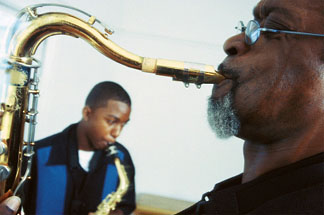Research on adolescent development by Child Trends notes that teens and their behaviors frequently “cluster”: good or bad behaviors (and good or bad peers) tend to come in groups. For instance, if your teen is struggling academically, he is likely to add a group of other negative behaviors, such as smoking, taking drugs, binge drinking or risky sexual behavior; and he will likely associate with friends who struggle with those same issues. As the number of negative behaviors increases, teens will isolate themselves in groups that have similar behaviors. Clearly, this phenomenon presents enormous challenges for fathers who hope to intervene and help their adolescents.
 The survey also lists some positive ways fathers can contribute to their teens’ lives and help them navigate the adolescent years without serious trauma. They can model and promote physical health through exercise and good eating habits, encourage their teens in school, attend their extracurricular activities, and help them understand the consequences of risky behaviors.
The survey also lists some positive ways fathers can contribute to their teens’ lives and help them navigate the adolescent years without serious trauma. They can model and promote physical health through exercise and good eating habits, encourage their teens in school, attend their extracurricular activities, and help them understand the consequences of risky behaviors.
Kristin Moore, president of Child Trends, sums up the findings aptly: “These findings suggest that parents need to remain actively and positively involved in the lives of their teenagers, while also allowing adolescents to take on greater independence for their conduct, as appropriate for their ages.”
The key for fathers of adolescents is finding a balance between being supportive and caring, while still monitoring behavior and enforcing family rules. Finding middle ground is difficult for many of us fathers. If we’re too strict and inhibit our children’s independence, they are more likely to engage in risky behaviors out of rebellion. On the other hand, teens who have overly warm and permissive fathers tend to be impulsive and make many of those same poor decisions.
In the face of these challenges, we fathers would be well served to cluster, as well—to seek support from other like-minded dads and multiply our positive influence. One father named John credits another dad for helping him bridge the chasm between himself and his daughter.
When John learned that his daughter was engaging in risky sexual behaviors, he was overwhelmed with shame. First he blamed his daughter, then himself. After several weeks, another father challenged him to forgive his daughter, look to the future and seek to rebuild the relationship. John told me, “The last thing I wanted to hear was that I should forgive her. It didn’t make sense! This was her problem! It took a long time, but when I finally gave up and forgave her, our relationship turned a corner. My friend continues to ask about my daughter and encourage me in that relationship.”
ACTION POINTS
- Discuss with your teen the consequences of risky behaviors. Urge her to live responsibly as a first step in becoming more independent.
- Ask your wife or the mother of your children how you could improve as a father in these areas: supporting your children, monitoring their world, caring for them, and enforcing family rules.
Reach out to one of your child’s friends by including him in an activity you have planned with your child. - Tell another father a specific challenge you’re facing as a father and ask for his input.
- Consider starting a fathering small group with some other dads you know.

